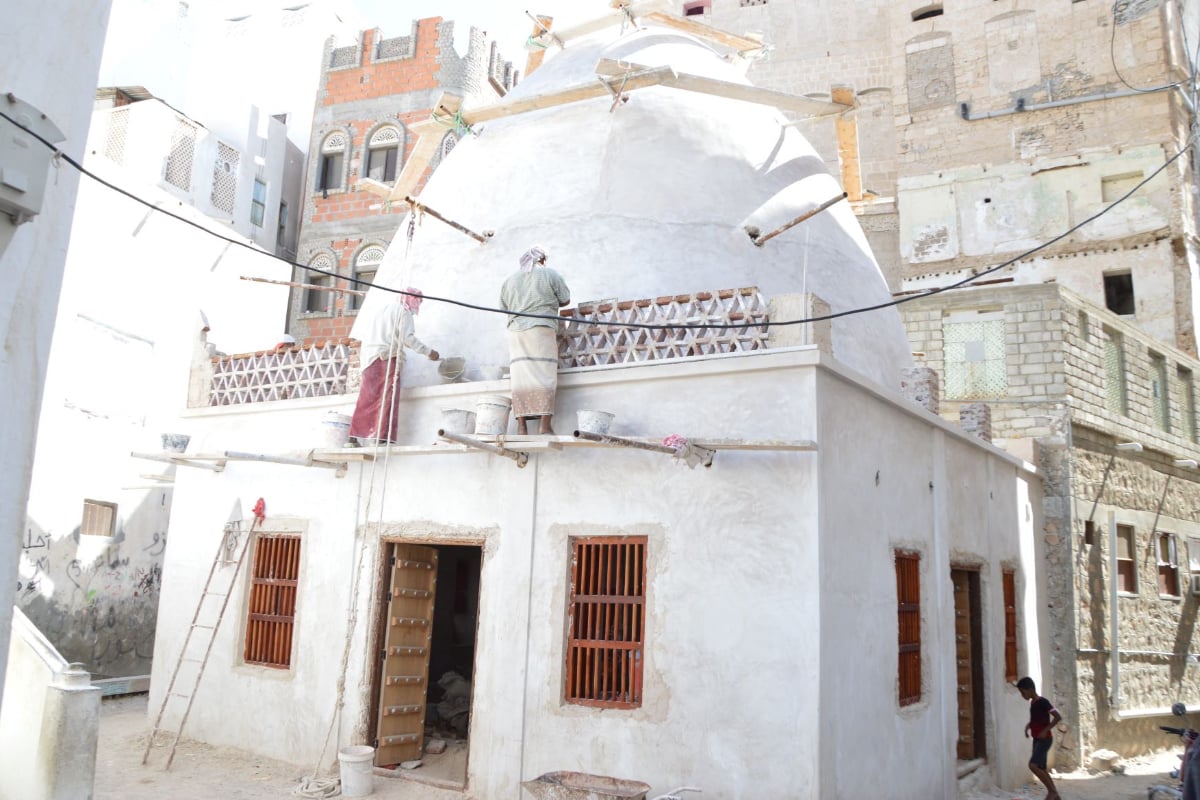
Cultural site reparations, supported by the British Council’s Cultural Protection Fund
Photo: British Council
Culture as a global public good
As UNESCO’s World Conference on Cultural Policies and Sustainable Development takes place in Mexico, Stephen Stenning reflects on the vital role the arts play in achieving UN Sustainable Development Goals.
Forty years after its first conference, UNESCO is bringing together government officials, cultural leaders and practitioners from 193 countries at Mondiacult 2022 to pave the way for the full integration of culture as a global public good beyond 2030. I am in attendance as part of the British Council delegation, with observer status.
In 2015, the UN established the 17 Sustainable Development Goals (SDGs) as a shared blueprint for peace and prosperity for people and the planet to be achieved by 2030. The SDGs have since provided a rallying point for collective action on global challenges and have moved the dialogue away from ‘international development’ that applies to some countries, to ‘sustainable development’ that applies to all.
But our recent research, entitled The Missing Pillar, reveals that culture was largely missing from the SDGs and its contribution to sustainability was not properly acknowledged. This gap gives increasingly importance to Mondiacult as a timely opportunity to recalibrate and look beyond, particularly to shape a more resilient cultural sector, fully anchored in the perspectives of sustainable development.
A more resilient cultural sector
A more resilient cultural sector is crucial, but the ambition for culture is far greater. As UNESCO Assistant Director-General for Culture Ernesto Ottone says: “Culture is what defines us. It is the common thread between our past, present and future. It is an inexhaustible and renewable resource, which adapts to changing contexts and drives our capacity to imagine, create and innovate.”
And it is with this belief the Missing Pillar report has developed into our advocacy programme, bringing together different responses to global challenges through research, talks and events.
Under this programme, our side-event ‘On the Road to Mondiacult’ was a dialogue on international cultural cooperation, organised in partnership with the World Cities Cultural Forum. The two recurring messages from the event were the need to take people-centred approaches and to better connect cultural heritage with contemporary culture with a focus on sustainability.
At Mondiacult, a key role of the British Council is to bring in a range of perspectives, which we have gathered through our projects and connections in more than 100 countries. Our global network allows us to understand the cultural context and build relationships with civil society organisations to co-create locally led responses to cultural challenges.
Most creative work is informal
While cultural creativity is “an inexhaustible and renewable resource”, it is the essential energy resource that will drive the global economy and job creation. This is already evident from the fact that more young people, aged 15-29, work in the creative industry than in any other economic sector. But, similar to all global economic activity, most of the creative work is informal.
To look at the informal economy and culture in the global South, we have been working with an international council of cultural actors and the UK’s Creative Industries Policy and Evidence Centre.
We have found that the share of informal activity in the creative industry is higher than that of other economic sectors, meaning the industry is more vulnerable to shocks such as Covid-19. The creative sector, therefore, needs dedicated attention in building back better efforts, especially through innovative policies.
We have also accelerated our efforts on other fronts. Our Cultural Protection Fund, which we manage on behalf of DCMS takes a pioneering approach to protect cultural heritage by working with local organisations and in ways which contribute directly to social cohesion and economic sustainability.
Since its creation in 2016, we have supported 70 cultural protection projects in 17 countries with around £35m of funding. Moving forward, our focus will be on cultural heritage at risk due to climate change.
The change required is cultural
Cultural heritage work is the ideal starting point for relationship-building and mutual approach. It requires an interest in other peoples’ cultures and appreciating the things that matter and give meaning and value to them. It necessarily takes the ‘long view’, with a focus on what we leave behind as a legacy for generations to come in line with sustainable development. It also encourages an appreciation of traditional ways of knowing and of living with the natural world.
There is a great deal in that appreciation of cultural heritage that can inform new ways of being, that culture change that is required. Key to the Mondiacult ambition of ‘culture as a global public good’ is understanding not only that arts and culture are at the centre of sustainable development, but that the change required is a cultural one.
It is important that the world’s cultural leaders at Mondiacult embrace the broader understanding of culture as the glue that binds humanity together. We need to move beyond the idea of creative industries as an isolated phenomenon and towards embracing traditions and practices passed down over generations and creative expressions conjuring up our new futures. We can then build a strong and lasting bridge between the missing pillar and the sustainable development agenda.
Stephen Stenning is Global Director, Culture in Action at the British Council.
![]() @BritishArts | @Mondiacult | @StephenStenning
@BritishArts | @Mondiacult | @StephenStenning

Join the Discussion
You must be logged in to post a comment.